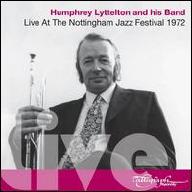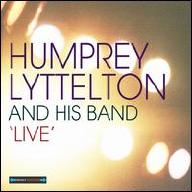In early 1948 Lyttelton resigned from the Dixielanders to found his own group, bringing Fawkes and later pianist Webb with him -- with the subsequent additions of Blackpool-born brothers Keith (trombone) and Ian Christie (clarinet), the group emerged at the forefront of the trad jazz renaissance. With Lyttelton's declamatory trumpet out front, the group's reverential, New Orleans-inspired sound proved a commercial juggernaut -- in late 1949, they signed to Parlophone, and their 78-rpm efforts sold so consistently that the label issued a new release each month until introducing the LP format several years later. However, Lyttelton quickly felt smothered within the narrow creative confines of the trad jazz sound and began embracing Latin and African rhythms as early as 1951 -- he also exploited new technologies, employing multi-track recording techniques to play trumpet, clarinet, piano, and washboard on One Man Went to Blow. Most notably -- and to the endless chagrin of purists -- Lyttelton soon abandoned the accepted trumpet-clarinet-trombone format to introduce saxophones into the equation, and as his musical aspirations evolved, so did the lineup of his support staff: the Lyttelton band was the launching pad for a multitude of fledgling jazz greats, among them saxophonists Tony Coe, Danny Moss, Alan Barnes, Joe Temperley, John Barnes, and Karen Sharp as well as trombonists Roy Williams, Pete Strange, and John Picard. The group also backed visiting American giants like Sidney Bechet, Jimmy Rushing, and Buck Clayton.
With 1956's self-penned Bad Penny Blues, Lyttelton scored British jazz's first-ever Top 20 U.K. pop hit -- the group went on to tour Europe and the Middle East, and in 1959 joined Thelonious Monk and Anita O'Day on a trek across the U.S. As the trad jazz vogue gave way to rock & roll, Lyttelton continued performing, but he also launched a secondary career as a broadcaster -- his witty and informal presence made him a natural for radio, and in 1966 he was awarded his own BBC series, The Best of Jazz, which he helmed for over four decades. Six years later, he was also appointed host of the spoof panel game I'm Sorry, I Haven't a Clue, a program notorious for its abundance of double entendres. He also continued his writing, over the course of his lifetime publishing a series of books including I Play as I Please, Second Course, Take It from the Top, Why No Beethoven, and It Just Occurred to Me..., and for a time he even served as a restaurant critic. Another hobby was calligraphy: Lyttelton received a set of calligraphic pens upon his father's death, and proved so adept that he was elected president of the Society for Italic Handwriting. The craft even lent its name to his own label, Calligraph Records, which served to re-release his classic recordings on CD. A new generation of listeners was exposed to Lyttelton's work in 2001 when he guested on the Radiohead album Amnesiac. On March 11, 2008, he announced his retirement from The Best of Jazz. Weeks later, he died following heart surgery on April 25. ~ Jason Ankeny, Rovi















